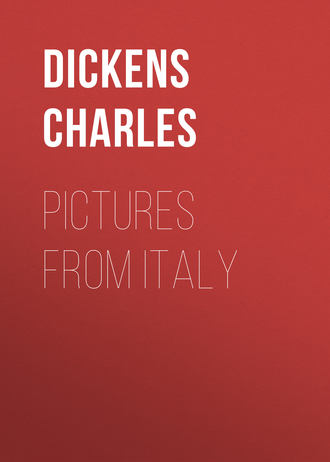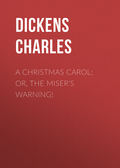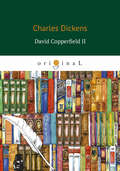
Чарльз Диккенс
Pictures from Italy
I went, another night, to see these Puppets act a play called ‘St. Helena, or the Death of Napoleon.’ It began by the disclosure of Napoleon, with an immense head, seated on a sofa in his chamber at St. Helena; to whom his valet entered with this obscure announcement:
‘Sir Yew ud se on Low?’ (the ow, as in cow).
Sir Hudson (that you could have seen his regimentals!) was a perfect mammoth of a man, to Napoleon; hideously ugly, with a monstrously disproportionate face, and a great clump for the lower-jaw, to express his tyrannical and obdurate nature. He began his system of persecution, by calling his prisoner ‘General Buonaparte;’ to which the latter replied, with the deepest tragedy, ‘Sir Yew ud se on Low, call me not thus. Repeat that phrase and leave me! I am Napoleon, Emperor of France!’ Sir Yew ud se on, nothing daunted, proceeded to entertain him with an ordinance of the British Government, regulating the state he should preserve, and the furniture of his rooms: and limiting his attendants to four or five persons. ‘Four or five for me!’ said Napoleon. ‘Me! One hundred thousand men were lately at my sole command; and this English officer talks of four or five for me!’ Throughout the piece, Napoleon (who talked very like the real Napoleon, and was, for ever, having small soliloquies by himself) was very bitter on ‘these English officers,’ and ‘these English soldiers;’ to the great satisfaction of the audience, who were perfectly delighted to have Low bullied; and who, whenever Low said ‘General Buonaparte’ (which he always did: always receiving the same correction), quite execrated him. It would be hard to say why; for Italians have little cause to sympathise with Napoleon, Heaven knows.
There was no plot at all, except that a French officer, disguised as an Englishman, came to propound a plan of escape; and being discovered, but not before Napoleon had magnanimously refused to steal his freedom, was immediately ordered off by Low to be hanged. In two very long speeches, which Low made memorable, by winding up with ‘Yas!’ – to show that he was English – which brought down thunders of applause. Napoleon was so affected by this catastrophe, that he fainted away on the spot, and was carried out by two other puppets. Judging from what followed, it would appear that he never recovered the shock; for the next act showed him, in a clean shirt, in his bed (curtains crimson and white), where a lady, prematurely dressed in mourning, brought two little children, who kneeled down by the bedside, while he made a decent end; the last word on his lips being ‘Vatterlo.’
It was unspeakably ludicrous. Buonaparte’s boots were so wonderfully beyond control, and did such marvellous things of their own accord: doubling themselves up, and getting under tables, and dangling in the air, and sometimes skating away with him, out of all human knowledge, when he was in full speech – mischances which were not rendered the less absurd, by a settled melancholy depicted in his face. To put an end to one conference with Low, he had to go to a table, and read a book: when it was the finest spectacle I ever beheld, to see his body bending over the volume, like a boot-jack, and his sentimental eyes glaring obstinately into the pit. He was prodigiously good, in bed, with an immense collar to his shirt, and his little hands outside the coverlet. So was Dr. Antommarchi, represented by a puppet with long lank hair, like Mawworm’s, who, in consequence of some derangement of his wires, hovered about the couch like a vulture, and gave medical opinions in the air. He was almost as good as Low, though the latter was great at all times – a decided brute and villain, beyond all possibility of mistake. Low was especially fine at the last, when, hearing the doctor and the valet say, ‘The Emperor is dead!’ he pulled out his watch, and wound up the piece (not the watch) by exclaiming, with characteristic brutality, ‘Ha! ha! Eleven minutes to six! The General dead! and the spy hanged!’ This brought the curtain down, triumphantly.
There is not in Italy, they say (and I believe them), a lovelier residence than the Palazzo Peschiere, or Palace of the Fishponds, whither we removed as soon as our three months’ tenancy of the Pink Jail at Albaro had ceased and determined.
It stands on a height within the walls of Genoa, but aloof from the town: surrounded by beautiful gardens of its own, adorned with statues, vases, fountains, marble basins, terraces, walks of orange-trees and lemon-trees, groves of roses and camellias. All its apartments are beautiful in their proportions and decorations; but the great hall, some fifty feet in height, with three large windows at the end, overlooking the whole town of Genoa, the harbour, and the neighbouring sea, affords one of the most fascinating and delightful prospects in the world. Any house more cheerful and habitable than the great rooms are, within, it would be difficult to conceive; and certainly nothing more delicious than the scene without, in sunshine or in moonlight, could be imagined. It is more like an enchanted place in an Eastern story than a grave and sober lodging.
How you may wander on, from room to room, and never tire of the wild fancies on the walls and ceilings, as bright in their fresh colouring as if they had been painted yesterday; or how one floor, or even the great hall which opens on eight other rooms, is a spacious promenade; or how there are corridors and bed-chambers above, which we never use and rarely visit, and scarcely know the way through; or how there is a view of a perfectly different character on each of the four sides of the building; matters little. But that prospect from the hall is like a vision to me. I go back to it, in fancy, as I have done in calm reality a hundred times a day; and stand there, looking out, with the sweet scents from the garden rising up about me, in a perfect dream of happiness.
There lies all Genoa, in beautiful confusion, with its many churches, monasteries, and convents, pointing up into the sunny sky; and down below me, just where the roofs begin, a solitary convent parapet, fashioned like a gallery, with an iron across at the end, where sometimes early in the morning, I have seen a little group of dark-veiled nuns gliding sorrowfully to and fro, and stopping now and then to peep down upon the waking world in which they have no part. Old Monte Faccio, brightest of hills in good weather, but sulkiest when storms are coming on, is here, upon the left. The Fort within the walls (the good King built it to command the town, and beat the houses of the Genoese about their ears, in case they should be discontented) commands that height upon the right. The broad sea lies beyond, in front there; and that line of coast, beginning by the light-house, and tapering away, a mere speck in the rosy distance, is the beautiful coast road that leads to Nice. The garden near at hand, among the roofs and houses: all red with roses and fresh with little fountains: is the Acqua Sola – a public promenade, where the military band plays gaily, and the white veils cluster thick, and the Genoese nobility ride round, and round, and round, in state-clothes and coaches at least, if not in absolute wisdom. Within a stone’s-throw, as it seems, the audience of the Day Theatre sit: their faces turned this way. But as the stage is hidden, it is very odd, without a knowledge of the cause, to see their faces changed so suddenly from earnestness to laughter; and odder still, to hear the rounds upon rounds of applause, rattling in the evening air, to which the curtain falls. But, being Sunday night, they act their best and most attractive play. And now, the sun is going down, in such magnificent array of red, and green, and golden light, as neither pen nor pencil could depict; and to the ringing of the vesper bells, darkness sets in at once, without a twilight. Then, lights begin to shine in Genoa, and on the country road; and the revolving lanthorn out at sea there, flashing, for an instant, on this palace front and portico, illuminates it as if there were a bright moon bursting from behind a cloud; then, merges it in deep obscurity. And this, so far as I know, is the only reason why the Genoese avoid it after dark, and think it haunted.
My memory will haunt it, many nights, in time to come; but nothing worse, I will engage. The same Ghost will occasionally sail away, as I did one pleasant autumn evening, into the bright prospect, and sniff the morning air at Marseilles.
The corpulent hairdresser was still sitting in his slippers outside his shop-door there, but the twirling ladies in the window, with the natural inconstancy of their sex, had ceased to twirl, and were languishing, stock still, with their beautiful faces addressed to blind corners of the establishment, where it was impossible for admirers to penetrate.
The steamer had come from Genoa in a delicious run of eighteen hours, and we were going to run back again by the Cornice road from Nice: not being satisfied to have seen only the outsides of the beautiful towns that rise in picturesque white clusters from among the olive woods, and rocks, and hills, upon the margin of the Sea.
The Boat which started for Nice that night, at eight o’clock, was very small, and so crowded with goods that there was scarcely room to move; neither was there anything to cat on board, except bread; nor to drink, except coffee. But being due at Nice at about eight or so in the morning, this was of no consequence; so when we began to wink at the bright stars, in involuntary acknowledgment of their winking at us, we turned into our berths, in a crowded, but cool little cabin, and slept soundly till morning.
The Boat, being as dull and dogged a little boat as ever was built, it was within an hour of noon when we turned into Nice Harbour, where we very little expected anything but breakfast. But we were laden with wool. Wool must not remain in the Custom-house at Marseilles more than twelve months at a stretch, without paying duty. It is the custom to make fictitious removals of unsold wool to evade this law; to take it somewhere when the twelve months are nearly out; bring it straight back again; and warehouse it, as a new cargo, for nearly twelve months longer. This wool of ours, had come originally from some place in the East. It was recognised as Eastern produce, the moment we entered the harbour. Accordingly, the gay little Sunday boats, full of holiday people, which had come off to greet us, were warned away by the authorities; we were declared in quarantine; and a great flag was solemnly run up to the mast-head on the wharf, to make it known to all the town.
It was a very hot day indeed. We were unshaved, unwashed, undressed, unfed, and could hardly enjoy the absurdity of lying blistering in a lazy harbour, with the town looking on from a respectful distance, all manner of whiskered men in cocked hats discussing our fate at a remote guard-house, with gestures (we looked very hard at them through telescopes) expressive of a week’s detention at least: and nothing whatever the matter all the time. But even in this crisis the brave Courier achieved a triumph. He telegraphed somebody (I saw nobody) either naturally connected with the hotel, or put en rapport with the establishment for that occasion only. The telegraph was answered, and in half an hour or less, there came a loud shout from the guard-house. The captain was wanted. Everybody helped the captain into his boat. Everybody got his luggage, and said we were going. The captain rowed away, and disappeared behind a little jutting corner of the Galley-slaves’ Prison: and presently came back with something, very sulkily. The brave Courier met him at the side, and received the something as its rightful owner. It was a wicker basket, folded in a linen cloth; and in it were two great bottles of wine, a roast fowl, some salt fish chopped with garlic, a great loaf of bread, a dozen or so of peaches, and a few other trifles. When we had selected our own breakfast, the brave Courier invited a chosen party to partake of these refreshments, and assured them that they need not be deterred by motives of delicacy, as he would order a second basket to be furnished at their expense. Which he did – no one knew how – and by-and-by, the captain being again summoned, again sulkily returned with another something; over which my popular attendant presided as before: carving with a clasp-knife, his own personal property, something smaller than a Roman sword.
The whole party on board were made merry by these unexpected supplies; but none more so than a loquacious little Frenchman, who got drunk in five minutes, and a sturdy Cappuccíno Friar, who had taken everybody’s fancy mightily, and was one of the best friars in the world, I verily believe.
He had a free, open countenance; and a rich brown, flowing beard; and was a remarkably handsome man, of about fifty. He had come up to us, early in the morning, and inquired whether we were sure to be at Nice by eleven; saying that he particularly wanted to know, because if we reached it by that time he would have to perform Mass, and must deal with the consecrated wafer, fasting; whereas, if there were no chance of his being in time, he would immediately breakfast. He made this communication, under the idea that the brave Courier was the captain; and indeed he looked much more like it than anybody else on board. Being assured that we should arrive in good time, he fasted, and talked, fasting, to everybody, with the most charming good humour; answering jokes at the expense of friars, with other jokes at the expense of laymen, and saying that, friar as he was, he would engage to take up the two strongest men on board, one after the other, with his teeth, and carry them along the deck. Nobody gave him the opportunity, but I dare say he could have done it; for he was a gallant, noble figure of a man, even in the Cappuccíno dress, which is the ugliest and most ungainly that can well be.
All this had given great delight to the loquacious Frenchman, who gradually patronised the Friar very much, and seemed to commiserate him as one who might have been born a Frenchman himself, but for an unfortunate destiny. Although his patronage was such as a mouse might bestow upon a lion, he had a vast opinion of its condescension; and in the warmth of that sentiment, occasionally rose on tiptoe, to slap the Friar on the back.
When the baskets arrived: it being then too late for Mass: the Friar went to work bravely: eating prodigiously of the cold meat and bread, drinking deep draughts of the wine, smoking cigars, taking snuff, sustaining an uninterrupted conversation with all hands, and occasionally running to the boat’s side and hailing somebody on shore with the intelligence that we must be got out of this quarantine somehow or other, as he had to take part in a great religious procession in the afternoon. After this, he would come back, laughing lustily from pure good humour: while the Frenchman wrinkled his small face into ten thousand creases, and said how droll it was, and what a brave boy was that Friar! At length the heat of the sun without, and the wine within, made the Frenchman sleepy. So, in the noontide of his patronage of his gigantic protégé, he lay down among the wool, and began to snore.
It was four o’clock before we were released; and the Frenchman, dirty and woolly, and snuffy, was still sleeping when the Friar went ashore. As soon as we were free, we all hurried away, to wash and dress, that we might make a decent appearance at the procession; and I saw no more of the Frenchman until we took up our station in the main street to see it pass, when he squeezed himself into a front place, elaborately renovated; threw back his little coat, to show a broad-barred velvet waistcoat, sprinkled all over with stars; then adjusted himself and his cane so as utterly to bewilder and transfix the Friar, when he should appear.
The procession was a very long one, and included an immense number of people divided into small parties; each party chanting nasally, on its own account, without reference to any other, and producing a most dismal result. There were angels, crosses, Virgins carried on flat boards surrounded by Cupids, crowns, saints, missals, infantry, tapers, monks, nuns, relics, dignitaries of the church in green hats, walking under crimson parasols: and, here and there, a species of sacred street-lamp hoisted on a pole. We looked out anxiously for the Cappuccíni, and presently their brown robes and corded girdles were seen coming on, in a body.
I observed the little Frenchman chuckle over the idea that when the Friar saw him in the broad-barred waistcoat, he would mentally exclaim, ‘Is that my Patron! That distinguished man!’ and would be covered with confusion. Ah! never was the Frenchman so deceived. As our friend the Cappuccíno advanced, with folded arms, he looked straight into the visage of the little Frenchman, with a bland, serene, composed abstraction, not to be described. There was not the faintest trace of recognition or amusement on his features; not the smallest consciousness of bread and meat, wine, snuff, or cigars. ‘C’est lui-même,’ I heard the little Frenchman say, in some doubt. Oh yes, it was himself. It was not his brother or his nephew, very like him. It was he. He walked in great state: being one of the Superiors of the Order: and looked his part to admiration. There never was anything so perfect of its kind as the contemplative way in which he allowed his placid gaze to rest on us, his late companions, as if he had never seen us in his life and didn’t see us then. The Frenchman, quite humbled, took off his hat at last, but the Friar still passed on, with the same imperturbable serenity; and the broad-barred waistcoat, fading into the crowd, was seen no more.
The procession wound up with a discharge of musketry that shook all the windows in the town. Next afternoon we started for Genoa, by the famed Cornice road.
The half-French, half-Italian Vetturíno, who undertook, with his little rattling carriage and pair, to convey us thither in three days, was a careless, good-looking fellow, whose light-heartedness and singing propensities knew no bounds as long as we went on smoothly. So long, he had a word and a smile, and a flick of his whip, for all the peasant girls, and odds and ends of the Sonnambula for all the echoes. So long, he went jingling through every little village, with bells on his horses and rings in his ears: a very meteor of gallantry and cheerfulness. But, it was highly characteristic to see him under a slight reverse of circumstances, when, in one part of the journey, we came to a narrow place where a waggon had broken down and stopped up the road. His hands were twined in his hair immediately, as if a combination of all the direst accidents in life had suddenly fallen on his devoted head. He swore in French, prayed in Italian, and went up and down, beating his feet on the ground in a very ecstasy of despair. There were various carters and mule-drivers assembled round the broken waggon, and at last some man of an original turn of mind, proposed that a general and joint effort should be made to get things to-rights again, and clear the way – an idea which I verily believe would never have presented itself to our friend, though we had remained there until now. It was done at no great cost of labour; but at every pause in the doing, his hands were wound in his hair again, as if there were no ray of hope to lighten his misery. The moment he was on his box once more, and clattering briskly down hill, he returned to the Sonnambula and the peasant girls, as if it were not in the power of misfortune to depress him.
Much of the romance of the beautiful towns and villages on this beautiful road, disappears when they are entered, for many of them are very miserable. The streets are narrow, dark, and dirty; the inhabitants lean and squalid; and the withered old women, with their wiry grey hair twisted up into a knot on the top of the head, like a pad to carry loads on, are so intensely ugly, both along the Riviera, and in Genoa, too, that, seen straggling about in dim doorways with their spindles, or crooning together in by-corners, they are like a population of Witches – except that they certainly are not to be suspected of brooms or any other instrument of cleanliness. Neither are the pig-skins, in common use to hold wine, and hung out in the sun in all directions, by any means ornamental, as they always preserve the form of very bloated pigs, with their heads and legs cut off, dangling upside-down by their own tails.
These towns, as they are seen in the approach, however: nestling, with their clustering roofs and towers, among trees on steep hill-sides, or built upon the brink of noble bays: are charming. The vegetation is, everywhere, luxuriant and beautiful, and the Palm-tree makes a novel feature in the novel scenery. In one town, San Remo – a most extraordinary place, built on gloomy open arches, so that one might ramble underneath the whole town – there are pretty terrace gardens; in other towns, there is the clang of shipwrights’ hammers, and the building of small vessels on the beach. In some of the broad bays, the fleets of Europe might ride at anchor. In every case, each little group of houses presents, in the distance, some enchanting confusion of picturesque and fanciful shapes.
The road itself – now high above the glittering sea, which breaks against the foot of the precipice: now turning inland to sweep the shore of a bay: now crossing the stony bed of a mountain stream: now low down on the beach: now winding among riven rocks of many forms and colours: now chequered by a solitary ruined tower, one of a chain of towers built, in old time, to protect the coast from the invasions of the Barbary Corsairs – presents new beauties every moment. When its own striking scenery is passed, and it trails on through a long line of suburb, lying on the flat sea-shore, to Genoa, then, the changing glimpses of that noble city and its harbour, awaken a new source of interest; freshened by every huge, unwieldy, half-inhabited old house in its outskirts: and coming to its climax when the city gate is reached, and all Genoa with its beautiful harbour, and neighbouring hills, bursts proudly on the view.





